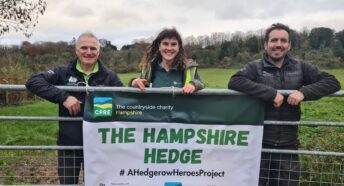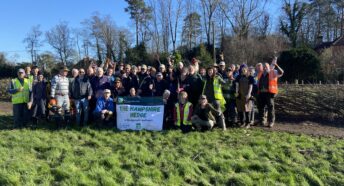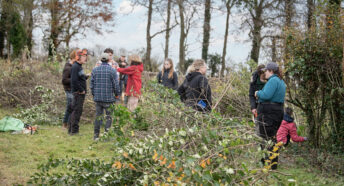Hedge laying traineeships
The power of an ancient craft in a modern world
Hedge laying is an ancient craft that has a powerful impact on our countryside of today. Proper hedgerow management reaps rewards for wildlife habitats, for assisting in mitigating climate change through carbon storage and in land management. It provides robust boundaries for livestock and crops, whilst protecting the soil from erosion and reduces flooding. The rewards are bountiful.
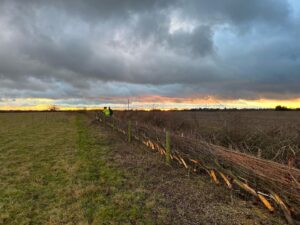
Since World War II, we have lost over 50% of our hedgerow network. They were taken from the land to accommodate larger machinery and the heightened demand for British grown food. This equates to over 500,000 km of hedge. Hedge layers themselves were a fundamental part of the land management system, with some older generations still being able to recall their presence as an everyday feature of agricultural life. Sadly, this is no longer the case.
So, what are the challenges and what can we do about it? At CPRE Hampshire, we are passionate about the restoration of our country’s hedgerows and things are slowly being turned around. One crucial area in which we’re working, is in reinvigorating the craft and skills needed, with a trainee hedge layer scheme. This is part of our ongoing Hedgerow Heroes project with support from the National Lottery Heritage Fund. It might be an ancient craft, but there is definitely a need in our modern world.
Nigel Adams, renowned hedgerow expert and practitioner and long time member of the Hedge Laying Society, explained more:
“At the moment, demand is definitely outstripping supply and we just haven’t got enough hedge layers. The process itself is easy to learn but as with other skills, such as blacksmithing, you need time and determination to make it your craft. The work is during the winter season so you can have other streams of income during the summer. I believe there are very few occupations that give you such a sense of achievement and wellbeing.”
Talking to some of our previously placed trainees, their passion and enthusiasm for the craft certainly backed up Nigel’s view.
Izzy had completed her degree in conservation biology and was volunteering with the National Trust whilst looking to get her first paid role. Here she explains more:
“The traineeship appealed because it was a career stepping stone. I had done some hedge laying before and enjoyed it and it also gave me the chance to get my chainsaw ticket which was a huge benefit.”
“The hedge laying itself, I loved. I had a great teacher, Clive Leeke of Hedgecraft in Oxfordshire, who was so helpful and keen to pass on everything they knew. It’s a craft that uses a specific set of skills and creativity. A lot of thought goes into building the hedge and looking back over what you’ve achieved is very satisfying.”
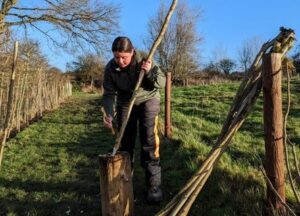
Izzy now has paid employment as a ranger with the National Trust. Working on land management and conservation, often alongside tenant farmers, they will be undertaking hedge laying this season. This is specifically because of the skills and knowledge Izzy gained as part of her CPRE Hampshire traineeship.
She has also gone on to place first in the Ladies Cup in novice hedge laying at an event run by the Devon Rural Skills Trust. It is at these events that you realise the how few women are learning these skills and becoming skilled hedge layers.
Talking to Mark Schofield from the South of England Hedge Laying Society (SOEHLS) he confirmed that only 10% of SOEHLS members are women and that there are no ethnic minorities at all. “Only 1% of our members are students. I would estimate that 15% of members are aged between 20 and 40, and the remainder are aged 40 and over. Certainly more young people are needed and we would love to see the low numbers of women and ethnic minorities involved improved.”
Sam was working on a 200 acre Cider Farm in Somerset helping with everything from harvesting the apples to making the cider. Having some experience of hedge laying at college, he already knew he enjoyed it and was really looking to building his overall skills and experience. The chance to get his chainsaw ticket was also a huge draw. Sam explains:
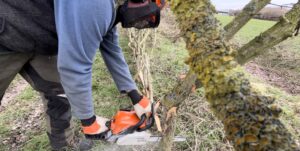 “I love that with hedge laying you see the difference you’ve made right away. It has great ecological benefits for wildlife and preserves an old countryside craft. I was surprised at how quickly you can get involved with the process and the pace at which you work. At college we focused on how they did it 100 years ago but with power tools we can work much quicker.”
“I love that with hedge laying you see the difference you’ve made right away. It has great ecological benefits for wildlife and preserves an old countryside craft. I was surprised at how quickly you can get involved with the process and the pace at which you work. At college we focused on how they did it 100 years ago but with power tools we can work much quicker.”
Now Assistant Estates Manager at an animal sanctuary he is working with his new employer to see how his passion and these skills can be used.
Rob, working for TCV at Stave Hill Ecological Park in central London, managed to accommodate the traineeship alongside his ongoing part-time role. After 5 years in construction, he had given himself a goal to work full-time in conservation and this was part of the stepping stones to help him achieve it. He loved it. Having not known much about hedge laying previously, his interest came from traditional woodland management and conservation. Here he explains more:
“There is a real buzz around hedge laying. It’s a traditional craft but it’s so necessary due to the depletion of hedgerows. I travelled out of London, an hour and a half each day to get to site by daybreak. The frost is on the ground, you have your first cup of tea for the day and then you get to work. Looking up you see nature. I saw birds of prey, green woodpeckers and stoats. The landowners we worked with were really happy to see the work getting done.
I was surprised at how quickly we learnt and got involved. I was laying 40 metres independently at the end of it. The chainsaw ticket and health and safety training was a step up for me and we also got our Bronze Level 1 Hedge Laying assessment from the National Hedge Laying Society.
Ian, our trainer, was great. He taught us a lot about how landowners can link with government grants to get hedges restored which is also now a big part of the work.”
In his current role, Rob is now working on incorporating educating and sharing his new found knowledge on the importance of hedges and their management to volunteers. Ultimately, he would love to work as a ranger or warden and feels this has been invaluable in building his experience towards this.
Talking again to Nigel, he expressed concern that some hedge layers may be reluctant to share their skills. He explains:
“The nature of the work of a hedge layer can be fairly isolating and you get used to working on your own. I think some people may worry about taking on the role of ‘teacher’ but whilst you need to explain the essentials, most of it is about having someone working alongside you, passing materials, handling the tools and listening as you pass tips on whilst you go. Trainees can be very helpful and it’s an incredibly rewarding experience to pass on an ancient craft.”
Rob and Sam both worked with Ian Metson, a professional hedge layer, from Hedgelife in Essex. He explained how he thought the traineeships were great not just for the industry but for the overall health of hedgerows – and therefore the nation. “Due to the governments recent commitment to hedgerows, the funding is there to get the work done. We are fully booked for 2024 and even into 2025. And we’re making only a small dent in what needs to be achieved. Building a team with the right skills and commitment is a challenge and that’s why the traineeships are so important.”
I know from talking to all three of our trainees, that it’s certainly ignited a passion for hedge laying that they’re determined to carry forward, even returning to continue to work with their traineeship teachers. That perhaps tells you all you need to know.
Are you interested in being an entry level, paid, trainee hedge layer?
Are you a hedge layer interested in taking on a trainee?
CPRE Hampshire’s round of applications for Hedge Laying Trainees will be open in July/August 2024. We are keen to connect with more hedge layers to take on trainees as part of this scheme, or alternately for shorter periods of time. If you are interested in working with us, or want to find out more information please contact our Hedgerow Project Officer, Ellie Banks ellie.banks@cprehampshire.org.uk.




